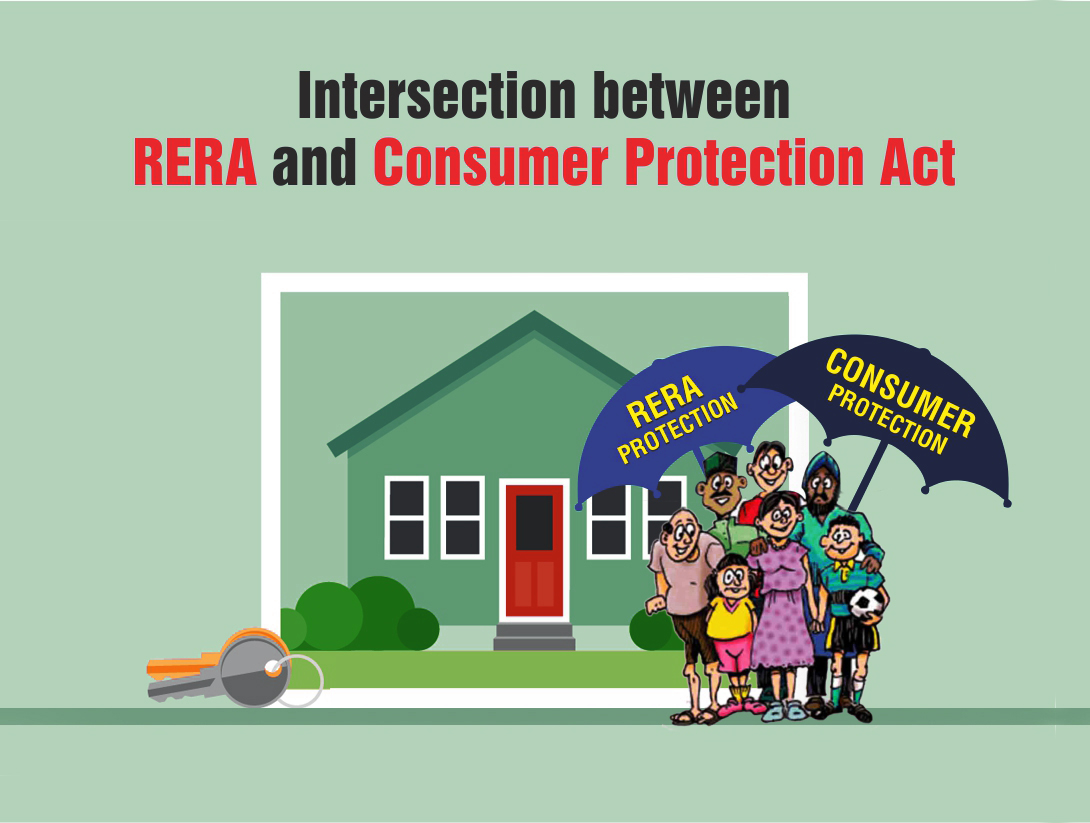INTERSECTION BETWEEN RERA AND CONSUMER PROTECTION ACT
Real Estate Sector is the most dynamically changing sector of the Indian economy and at the same time most unorganized and unregulated too. Though this sector contributes significantly to GDP of the country, implementation of relevant laws like Real Estate Regulation Act, 2016 and Consumer Protection Act 1982 can add great transparency to economy and the sector likewise. The real estate sector comprises of residential, commercial, retail and industrial spaces including alternate assets such as schools, hospitals, golf courses and hotels etc. Hoarding of Black Money , delayed possessions, unfulfilled promises by builders , breach of trust of innocent buyers, exploitation and ignorance – are conditions and rampant issues faced by consumers while dealing with real estate.
To tackle these issues, the legislature enacted The RERA Act, 2016. The RERA Act established the Real Estate Regulatory Authority for regulation and promotion of the real estate sector and to ensure sale of plot, apartment or building, as the case may be, or sale of real estate project, in an efficient and transparent manner and to protect the interest of the consumers in the real estate sector and to establish an adjudicating mechanism for speedy dispute redressal and also to establish an appellate tribunal to hear appeals from the decisions, directions or orders of the Real Estate Regulatory Authority.
But since its inception, RERA has found itself embroiled in a controversy with the advocates of Consumer Protection Act but in a recent judgment dated 2nd November 2020, passed by the Supreme Court of India in the case of M/s Imperia Structures Ltd v. Anil Patni & Another (Civil Appeal No. 3581 – 3590 of 2020) the apex court putting this controversy to rest has held that the redressal mechanism under the Real Estate (Regulation and Development) Act, 2016 does not act as a bar to complaints under the Consumer Protection Act, 2019. In this case the homebuyers filed complaints under the Consumer Protection Act, 2019 due to delay in handover of possession of the apartments by the builder. These complaints were filed just a week before the registration of the said project with the jurisdictional RERA authority which in this case was the Haryana Real Estate Regulatory Authority. The builder challenged the jurisdiction of the National Consumer Dispute Redressal Commission (NCDRC) on the ground that the apartments had been booked for commercial purposes or for the purposes of investments and therefore the homebuyers were not consumers within the provisions of the Consumer Protection Act. The NCDRC allowed the complaint of the homebuyers and directed the builders to refund the amount paid by the homebuyers along with interest and costs. The builders appealed to the Apex court against the decision of the NCDRC. The Supreme Court of India in this judgment concurred with the factual findings of the NCDRC that the homebuyers were consumers as defined under the Consumer Protection Act and that there was a delay in completing construction and handing over the apartments. Therefore, builders were liable to refund the amount paid by the homebuyers along with the interests.
Now, it is a settled law that a homebuyer can approach the consumer forum or the real estate regulatory authority to seek remedies against the builders for delayed possession of projects. Availing any remedy available under the Consumer Protection Act, 2019 cannot be said to be in violation of the statutory scheme prescribed under the Real Estate Regulation Act, 2016.
In this scenario, it becomes vital we explore the specific dynamics of both Consumer forums as well as RERA. Under the Consumer Court only registered purchasers and allottees can file complaints whereas any aggrieved person may file a complaint with the RERA, and person here includes association of allottees or any voluntary consumer association registered under any law.
Under the Consumer Court a complaint needs to be filed on a plain paper with documentary evidence whereas there is a specified format for filing a complaint before RERA. Every state’s RERA official website will have its complaint section and the homebuyer has to fill in the requisite details in the form prescribed.
Under the Consumer Court the case of a consumer complaint needs to be filed depending upon the pecuniary limits which is different on district, state and national levels whereas a complaint can be filed before the RERA where the property is situated. There are no pecuniary limits while filing a claim under the RERA.
Under the Consumer Court the central consumer protection authority have an investigation wing, headed by a Director-General, which may conduct inquiry or investigation into consumer law violations whereas investigations can be conducted on a complaint by a buyer or suo-motu against the builder under RERA.
As leading Property transfer lawyers in India, we take great pride in successfully advising many of our clients by explaining them pros and cons of all options that are available to them depending on their specific circumstances. We do our best in enabling all our clients to find out a speedy as well as efficacious remedy in relation to all their property woes.
Whichever route you choose, at Knowledgentia, with our expert advice on property registration in India and other related matters, you can be rest assured that you are in hands of the most genuine Property dispute lawyers in India.
Read more about consumer rights in-depth.








